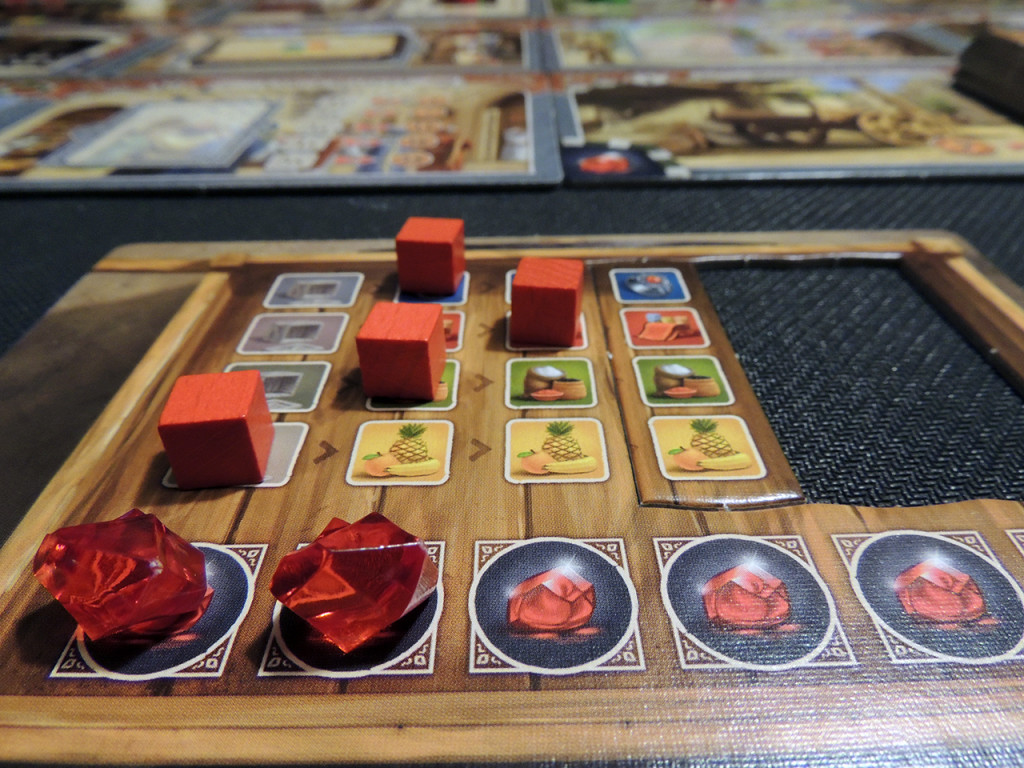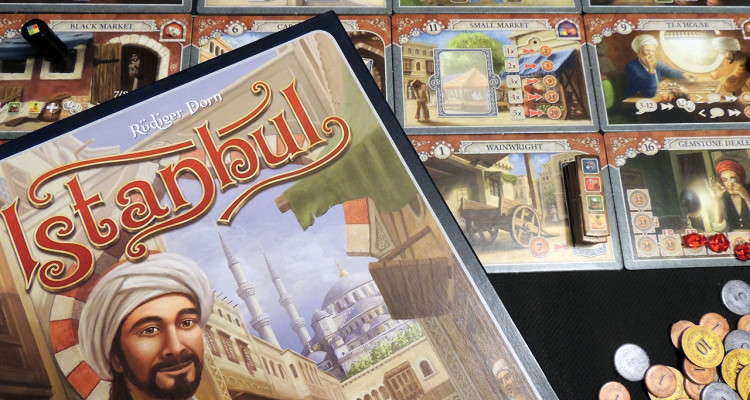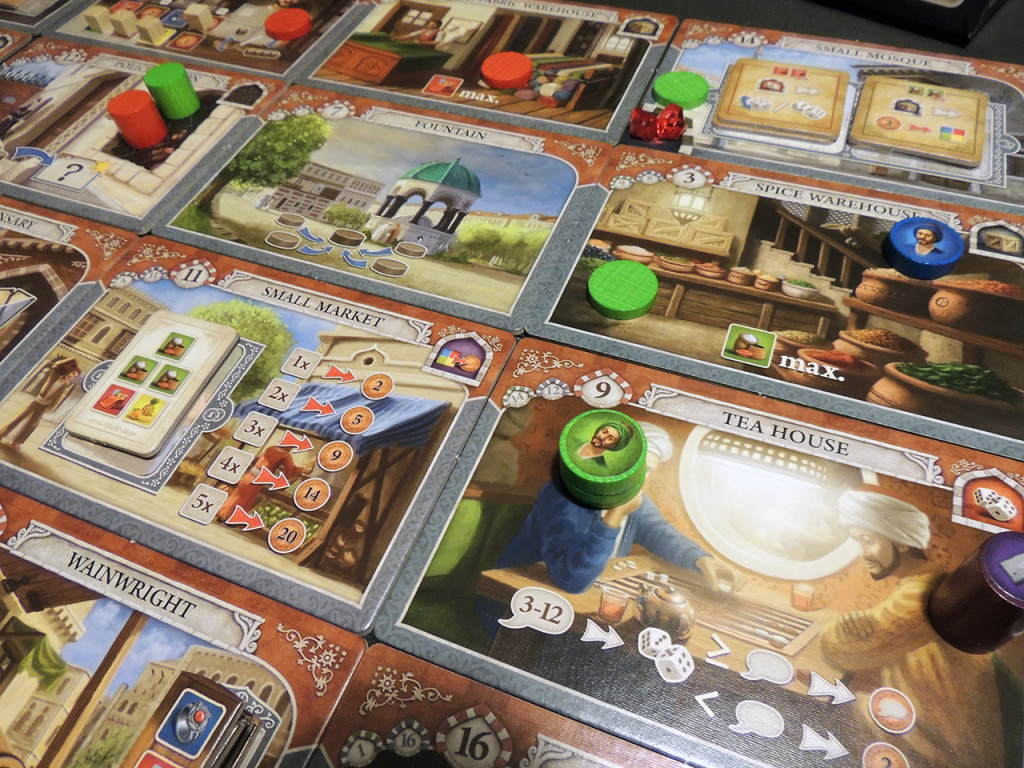Welcome to the hustle and bustle of the bazaar district of Istanbul! Taking on the role of a merchant with dreams of obtaining the most beautiful rubies in the land, you must wisely use your loyal assistants to strike the deals necessary to obtain these precious gemstones. How you decide to obtain these rubies is up to you. You can stock up your trusty wheelbarrow with various goods to sell at the markets, or you can spend your time gambling at the tea house to increase your wealth. You must plan accordingly, though, as other rival merchants have gotten wind of the riches that abound, and they want their piece of the kebab, too!
Istanbul is a midweight pickup and delivery game with a hybrid element of worker placement added to the mix. You will race around the board collecting and selling goods in order to amass riches and be the first merchant to collect five precious rubies. Each component of Istanbul is very high quality. The game features a modular board comprised of 16 thick cardboard tiles, each with detailed artwork that features the various locations you’ll be patronizing in your quest. Much like the sapphires from Sultaniya (our review here), the plastic rubies included here are certain to up the ‘Ooh, shiny!’ factor. From the wooden merchant/assistant bits to the player boards, everything was well thought out and looks fantastic. I would have found it useful if the box included an insert for all of the pieces, but they give you plenty of bags to organize everything how you see fit.
The core movement mechanics of Istanbul are unique and may seem confusing on your first couple of turns, but understanding this mechanic is key to mastering the game. On your turn, you MUST move your stack of merchant + assistants up to two spaces, in any orthogonal directions. You may not stand still, unless you play an ability card that allows you to do so, and you cannot backtrack over tiles in the same turn. When you stop at a tile, you drop off an assistant by removing one disc off of your stack and leaving it on the tile. You may then carry out the action of the tile. On subsequent turns you can revisit tiles where you have dropped off assistants and place them back atop your stack in order to carry out the action of the tile. As is with modular boards, the possibilities are numerous and replay value is somewhat high. Development and execution of your movement strategy will be paramount to your success during the game. When and where to pick up or drop off an assistant is the most common question you will ask yourself.

No merchant worth his salt can be seen moving about the market without his wheelbarrow, represented by your player board. Upgrading your wheelbarrow, while not completely necessary, allows you to hold more of each good. This in turn allows you to collect and trade higher quantities of goods for money and rubies. A fully upgraded wheelbarrow is also a way to gain one of your five winning rubies.
In the crowded bazaar, you will encounter various other characters going about their business. Your friends will constantly be pushing and shoving their way through in an attempt to execute their own strategy. If you stop on a tile where another player’s merchant token is present, you must pay them two Lira before taking that location’s action. If you cannot pay, then you may not carry out the action. Simply placing your merchant in the prospective path of your friends can hugely alter their game plan as the need to pay other merchants on a spot when you land there must be taken into account. Money is typically very tight throughout the game, so tactically maneuvering around or through your friends adds another layer of decision-making for you to consider. In your travels you may also encounter the Governor, the Smuggler or even the family member of another player, each of whom can allow you gain lira or to exchange/purchase action cards and goods.
Istanbul’s rulebook offers specific market setups for introductory games as well as those who are looking for a more strategic layout. We always start with the beginner configuration for new players but, Istanbul really shines when you shuffle up the tiles and randomly arrange the board. This allows the game to continually be challenging, strategic, and assists in evening the playing field for all players of varying levels. The game also offers some great variants for different player-counts to keep it enjoyable for the seasoned Istanbul player. While the goal of the game remains to be the first person to obtain five rubies, these different board setups often change the effectiveness of various strategies, and experimentation is encouraged! Overall, Istanbul combines an approachable, straightforward rule set with a great mix of mechanics from worker placement to pick up and deliver to press your luck mini dice games.
[su_custom_gallery source=”media: 10006,9999,10003″ limit=”3″ link=”lightbox” width=”230″ height=”230″ title=”never”]
LEAGUE RULING
Steebin
My wife and I absolutely love Istanbul. The game scales perfectly for two players and offers a couple different variants to keep the game interesting. My first playthrough warranted this a worthy addition to my collection. I was worried that it would be a little on the difficult side for casual gamers—like Wil Wheaton—but so far it has been a hit with all levels of gamers. The concept and goal of the game is easy to grasp and it also offers a good amount of strategy for the hardcore gamer. After many, many plays I can see the game will start to need some type of expansion to keep me intrigued, but aside from that there isn’t much on the negative side that I can say about this game. I always love when Istanbul hits the table!
Smee’s Two Pence
Istanbul is a title where the initial setup of the board weighs in heavily on the available strategies, and even the length of the game. Given that, there are a number of ways to play this quick-paced pickup and deliver game, which keeps it feeling new and different through repeated trips to the table.
Buns
Istanbul is a nice offering to mesh newer gamers with more seasoned gamers. The challenge of the game is not in number crunching or processing large amounts of possibilities, but rather in seeing a potential pathway (almost literally) to victory and executing it. Once you understand what each tile does and how to move your merchant about the board, there is little rulebook checking or clarification needed; it’s a simple game that allows you to focus more time on strategy and less on remembering how to do things. That said, the sweet spot for Istanbul can be hard to hit. It shines when the board is novel to everyone, as familiar board setups can lead to head starts—boards can be “solved.” Randomizing is an easy fix, but can provide mixed results, as game length can swing drastically, from as few as 30 minutes to as many as 90, depending on where things end up. All that said, Istanbul is well done and an altogether enjoyable middle-of-the-road euro game. I’d gladly take a trip to the bazaar anytime someone suggested it, though it wouldn’t necessarily be my first choice.








